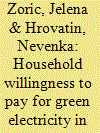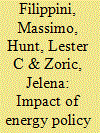| Srl | Item |
| 1 |
ID:
114302


|
|
|
|
|
| Publication |
2012.
|
| Summary/Abstract |
This paper analyses the willingness to pay for electricity generated from renewable energy sources in Slovenia. The results confirm that age, household income, education and environmental awareness play the most important role in explaining household attitudes to green electricity programmes. While the willingness to participate in green electricity programmes is influenced by education and environmental awareness, the willingness to pay for green electricity predominantly depends on household income. The results imply that green marketing should be accompanied by awareness-raising campaigns and should target younger, well-educated and high-income households. The expressed median willingness to pay is found to exceed the current level of mandatory charges for green electricity. Nevertheless, recent increases in final electricity prices might have already exhausted the capacity for additional voluntary contributions.
|
|
|
|
|
|
|
|
|
|
|
|
|
|
|
|
| 2 |
ID:
132643


|
|
|
|
|
| Publication |
2014.
|
| Summary/Abstract |
The promotion of energy efficiency is seen as one of the top priorities of EU energy policy (EC, 2010). In order to design and implement effective energy policy instruments, it is necessary to have information on energy demand price and income elasticities in addition to sound indicators of energy efficiency. This research combines the approaches taken in energy demand modelling and frontier analysis in order to econometrically estimate the level of energy efficiency for the residential sector in the EU-27 member states for the period 1996 to 2009. The estimates for the energy efficiency confirm that the EU residential sector indeed holds a relatively high potential for energy savings from reduced inefficiency. Therefore, despite the common objective to decrease 'wasteful' energy consumption, considerable variation in energy efficiency between the EU member states is established. Furthermore, an attempt is made to evaluate the impact of energy-efficiency measures undertaken in the EU residential sector by introducing an additional set of variables into the model and the results suggest that financial incentives and energy performance standards play an important role in promoting energy efficiency improvements, whereas informative measures do not have a significant impact.
|
|
|
|
|
|
|
|
|
|
|
|
|
|
|
|